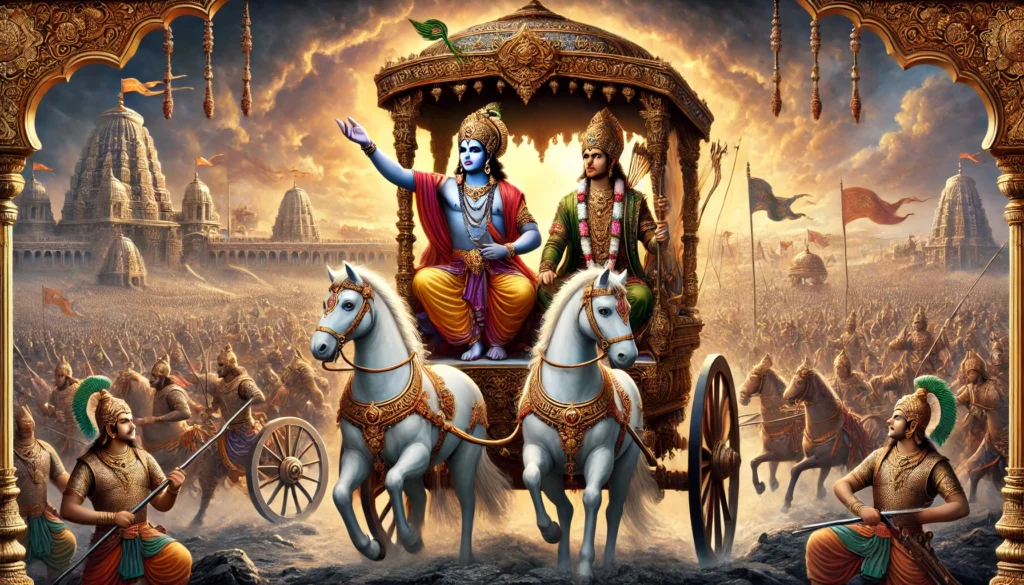धृतराष्ट्र उवाच
धर्मक्षेत्रे कुरुक्षेत्रे समवेता युयुत्सव: ।
मामका: पाण्डवाश्चैव किमकुर्वत सञ्जय ॥१॥
Chapter’s Name: Arjuna-Vishaad Yoga
This chapter is the incarnation of the great teachings given by Shri Bhagwan to the world in the form of the Bhagavad Gita using Arjuna as an instrument.
After the names of the main warriors of both sides are mentioned, it mainly describes the sorrow caused by the attachment of Arjuna due to the fear of his family being destroyed. This kind of sorrow also becomes a means of progressing towards welfare by the feeling of detachment from worldly pleasures when it gets good company.
Therefore, it is named “Arjun Vishada Yoga” (By Gita Press)
Arjuna’s Dilemma: Facing the Battlefield of the Mind
It is because of ignorance one thinks ‘What should I do and what should I not do’ – and suffers a state where he is not able to perform his duties. He will not attain that state of deviation from his duties if he is not subjugated to ignorance.
A person who believes in God, Dharma, and Afterlife faces dilemmas like, “If I don’t do my prescribed duties in life, then my downfall is sure to happen. What will happen to my spiritual life if I do only material duties?”
By engaging in worldly affairs, spirituality will be left and by engaging in spiritual affairs, worldly duties will not be right. If we leave our family, then our spiritual progress will not be there, etc.
The meaning is that we want our welfare, but due to attachment and desire for pleasure, we cannot leave the world.
This kind of disturbance also takes place in Arjun’s mind that if I fight, then my welfare will be hindered due to the destruction of our clan and if I do not fight, then my welfare will be hindered due to being deviated from my duty.
Bhagavad Gita Chapter 1 Summary Verse Wise
Verse 1: Dhritarashtra has asked Sanjaya about the details of the war.
Verse 2: Sanjaya describes how Duryodhan went to Dronacharya and starts the conversation.
Verse 3: Duryodhan asked Dronacharya to see the huge Pandava army,
Verses 4-6: and gave the names of the main warriors of that army in verses.
Verse 7: Asking Dronacharya to know the main army commanders of his army well,
Verses 8-9: He describes some of their names and the courage and war skills of some warriors.
Verse 10: He has described his army as invincible, and the Pandava army as weaker than his.
Verse 11: He has requested all the warriors to protect Bhishma.
Verse 12: Bhishma Pitamah’s blowing of the conch shell
Verse 13: the sound of various instruments like conch, nagara, drum, mridanga, and Narasimha, etc. being played simultaneously in the Kaurava army is described.
Verses 14-18: describe Lord Krishna, Arjuna, Bhimsen, Yudhishthira, Nakula, Sahadeva, and all other special warriors of the Pandava army blowing their conches respectively.
Verse 19: describes the sky and earth resonating with the terrifying sound of the conches and the distress of Duryodhan and others.
Verses 20-21: describe Arjuna, on seeing Dhritarashtra’s sons ready for the war, to take his chariot between the two armies.
Verses 22-23: show his desire to see everyone by signaling him to keep the chariot standing there until he has seen all the armies thoroughly.
Verses 24-25: describe Krishna’s chariot standing between the two armies as per Arjuna’s request and ask Arjuna to see all the warriors gathered for the war.
Verse 30: describes Arjuna’s distraught on seeing his relatives and Arjuna’s sorrowful state.
Verse 31: Arjuna has given a logical argument for not wanting victory and the pleasures of the kingdom by talking about the adverse consequences of war.
Verses 32-33: Arjuna has given a logical argument for not wanting victory and the pleasures of the kingdom.
Verse 34-35: Arjuna has described his relatives like Acharya etc. saying that even if they kill me or for the kingdom of the three worlds, I do not want to kill these Acharya and father-son etc. dear relatives.
Verses 36-37: Arjuna has said that even if relatives like Duryodhan etc. are tyrants, killing them will lead to sin and lack of happiness and joy.
Verses 38-39: Arjuna has said that not fighting a war is justified to avoid the sins of destruction of the clan and betrayal of friends.
Verses 40-44: Arjuna has described in detail the defects arising from the destruction of the clan.
Verses 45-46: Arjuna, while expressing grief, has described the preparation for war by killing one’s own relatives out of greed for kingdom and pleasure as the beginning of a great sin and has said that it would be better if he was killed by Duryodhan, etc.
Verse 47: Sanjaya has ended the chapter by saying that Arjuna, immersed in grief, having decided not to fight, gave up his weapons and went to his chariot.
सञ्जय उवाच
एवमुक्त्वार्जुनः संख्ये रथोपस्थ उपाविशत् ।
विसृज्य सशरं चापं शोकसंविग्नमानसः ॥४६॥
Read Bhagavad Gita Chapter 1 Online on Vedabase
With over three years of dedicated experience in studying and researching Indian scriptures, the author is passionate about sharing the profound wisdom of texts like the Bhagavad Gita, Puranas, and Upanishads. Through in-depth exploration of authentic commentaries, such as those by Gita Press, combined with thoughtful online research, the insights provided are both accurate and engaging.




